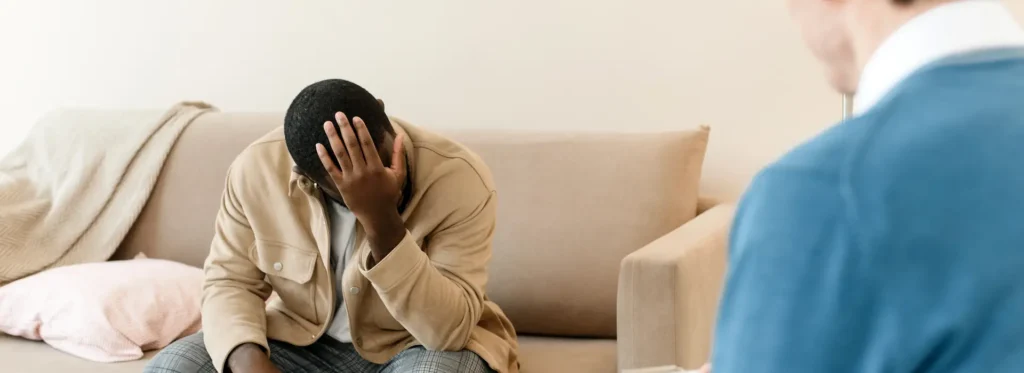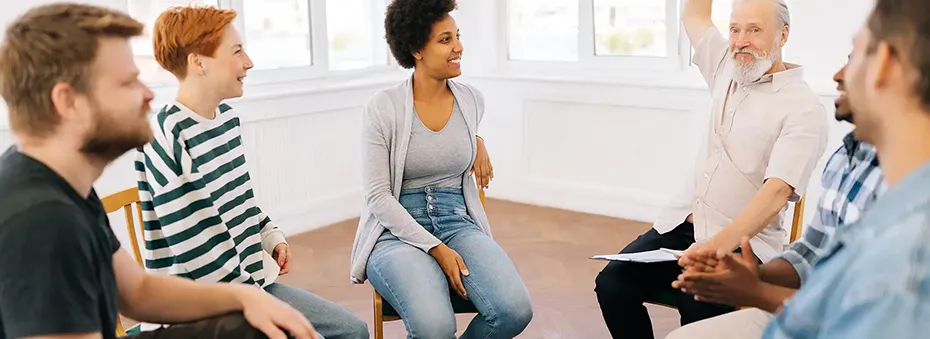Gambling Addiction Treatment | Getting Help for Gambling Disorder
If you’re struggling to control your gambling, you’re not alone. Effective help is available. Gambling addiction treatment can help you stop unhealthy gambling habits and regain control of your life. With the right support and tools, recovery is not only possible – it is achievable. This guide will walk you through practical ways to seek help and start your recovery journey.
Understanding Gambling Addiction
Gambling addiction is a behavioural disorder that can severely disrupt your health, relationships, and finances. Understanding the signs, risk factors, and how gambling affects mental health is a vital first step.
Signs and Symptoms of Gambling Addiction
Signs of gambling addiction may include:
- Frequent thoughts about gambling
- Restlessness or irritability when trying to stop
- Chasing losses by placing more bets
- Hiding the extent of gambling from loved ones
- Borrowing money or selling belongings to fund gambling
- Missing work or family events to gamble
You may find yourself continuing to gamble even when it hurts your life. Feelings of guilt and shame are common, but breaking the cycle of gambling is often difficult without professional support. Early symptoms of gambling addiction are sometimes subtle but can escalate if left unaddressed.
Risk Factors and Causes
Anyone can develop a gambling problem, but some risk factors increase vulnerability. A family history of gambling issues, early exposure to betting, or co-occurring conditions like depression or anxiety can all play a role.
Stress, isolation, or the desire to escape negative emotions often contribute to problematic gambling. For some, it is the thrill of the gamble; for others, a way to cope with boredom. Constant access to betting shops or online platforms increases the risk.
Problem gambling may emerge gradually, and without intervention, the consequences can be profound. Recognising these risk factors early can support timely intervention.
How Gambling Addiction Impacts Mental Health
Gambling is one impulse-control disorder that doesn’t just affect finances; it deeply impacts mental wellbeing. Gambling addiction is associated with high levels of stress, anxiety, and depression. Many affected people feel hopeless, and some may experience suicidal thoughts.
Relationships often suffer due to secrecy and broken trust. Isolation becomes a coping mechanism, leading to loneliness and withdrawal. Sleep issues, impaired concentration, and emotional volatility are common.
If you feel overwhelmed, help is available. Receiving treatment for gambling-related mental health concerns is essential for restoring wellbeing and safety.

Therapeutic Approaches for Gambling Addiction Treatment
There are several therapy options for addressing the root causes of compulsive gambling and helping you build a stable recovery.
Cognitive Behavioural Therapy Techniques
Cognitive behavioural therapy (CBT) is the leading gambling addiction treatment. It focuses on recognising and challenging unhelpful beliefs and behaviours linked to gambling. For example, believing that one more bet will solve your problems or that you’re due a win.
Therapists guide you in identifying gambling triggers and provide tools to manage urges. You might practise replacing gambling with healthier activities or keep track of your thought patterns.
CBT is widely regarded as one of the most effective therapy approaches for gambling addiction and is frequently used in both inpatient and outpatient settings.
Counselling and Psychotherapy Options
One-to-one counselling offers a space to explore your relationship with gambling and any underlying emotions or life stressors. Therapy may focus on short-term management or explore long-standing patterns, such as unresolved trauma or low self-esteem.
Psychodynamic psychotherapy, motivational interviewing, and integrative approaches are also used to treat gambling disorders. A mental health professional can help determine the right treatment for your needs.
Counselling provides personalised strategies for navigating cravings, stress, and setbacks in a confidential and compassionate setting.
Group Support and Peer Programmes
Support groups such as Gamblers Anonymous (GA) offer peer support for people with gambling problems. In these group therapy settings, you can share your story, receive encouragement, and learn from others on similar paths.
Structured programmes, including 12-step approaches, provide accountability and connection. Peer support is a vital part of recovery, helping reduce feelings of isolation and reinforcing motivation.
Some programmes are led by professionals, while others are entirely peer-run. The collective experience shared in these spaces can offer comfort and insight that therapy alone may not provide.
Medical and Alternative Treatment Strategies
Treatment programmes for gambling addiction often integrate medical care, digital support, and behavioural strategies. These options aim to treat gambling addiction from multiple angles, improving outcomes.
Pharmacological Interventions
Medication may be recommended when gambling addiction occurs alongside other conditions such as depression or anxiety. Selective serotonin reuptake inhibitors (SSRIs) and opioid antagonists have shown some benefit in managing cravings and impulse control.
Your GP or addiction services provider may assess if medication is suitable. Typically, medication is combined with therapy for the best results. It is not a standalone solution but can be a valuable part of a broader treatment plan.
Regular monitoring ensures effectiveness and helps manage side effects. When used thoughtfully, medication may help treat co-occurring issues that complicate recovery.
Self-Exclusion Programmes
Self-exclusion is a formal way to remove yourself from gambling environments. In the UK, services may allow you to block access to multiple online gambling platforms. In-person options exist, too. Self-exclusion reduces the temptation to gamble, supports therapy and recovery goals, and demonstrates commitment to change.
This strategy is most effective when combined with therapy, peer support, and ongoing professional guidance.
Digital Tools and Online Resources
Websites and apps designed to help people struggling with gambling addiction are increasingly available. These include self-help modules, online therapy, and community forums.
Digital tools may block gambling websites, provide cognitive behavioural exercises, and track progress and alert you to high-risk behaviours. Some platforms offer helpline services and 24/7 support. Used alongside therapy and medical care, digital support can play a powerful role in maintaining recovery.

Aftercare and Ongoing Support
Sustaining recovery from gambling addiction requires consistent effort, structured routines, and support systems.
Relapse Prevention Planning
A relapse prevention plan prepares you for moments when you may feel the urge to gamble. Work with your therapist to identify triggers, early warning signs, and coping strategies.
Common features include:
- Structured daily routines
- Coping tools like breathing techniques or distraction strategies
- Support contacts for crisis moments
Preventing relapse is not about perfection. It’s about preparation, awareness, and staying connected to recovery resources.
Reintegration into Daily Life
Returning to everyday life after treatment means rebuilding trust, routines, and self-confidence. Focus on financial responsibility, employment, and reconnecting with hobbies or community activities.
Simple actions, like setting spending limits or establishing tech-free zones, support long-term change. Joining aftercare programmes or alumni groups can ease the transition and provide continued motivation.
Community and Family Support Systems
Family support is essential. Addiction comes in many forms, and gambling is no exception. When families are involved in recovery, outcomes improve.
Family therapy can address damaged relationships and teach communication skills. Support groups for family members of people with gambling addiction, such as Gam-Anon, offer understanding and tools for navigating the journey.
Involving trusted individuals in your recovery builds accountability and connection. Support networks make a real difference in long-term success.
Rebuild Your Life at PROMIS
For people living with gambling addiction, recovery is possible with the right guidance and therapeutic framework. PROMIS has worked with patients facing a wide range of addictive behaviours, including compulsive gambling, offering a calm space to pause, reflect, and rebuild. Our team understands that the journey to recovery is deeply personal, so we provide the tools and support needed to make lasting change.
Frequently Asked Questions
What are the most effective approaches to treating gambling addiction?
Cognitive behavioural therapy, support groups, and in some cases, medication. Inpatient and outpatient programmes that offer tailored, evidence-based care are especially effective.
How does CBT help with compulsive gambling?
CBT addresses the thought patterns that fuel gambling. It teaches you how to manage triggers, reduce urges, and change your behaviour.
Can medication help manage gambling addiction?
Yes, particularly when mental health issues such as anxiety or depression are present. Antidepressants or opioid antagonists may help reduce cravings.
What support groups are available for gambling addiction?
Gamblers Anonymous is a widely known option. Other online and in-person support groups, including those offered through the NHS Northern Gambling Service, provide peer-led recovery pathways.
How can family members support someone with a gambling addiction?
Encourage your loved one to seek help. Attend family therapy or join support groups like Gam-Anon to gain tools for navigating the process together.
What should I look for in a treatment programme for gambling addiction?
Look for a treatment facility offering personalised plans, qualified mental health professionals, a mix of individual and group therapy, and ongoing aftercare options. Receiving professional help tailored to your needs is key to lasting recovery.
